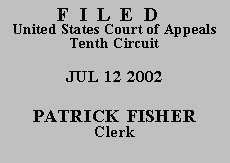

| DERMICO DEON WRIGHT, |
|
Mr. Wright was convicted by a jury of unlawful delivery of a controlled drug after one previous conviction and sentenced to ten years of imprisonment. His conviction resulted from an informant purchasing $60 worth of crack cocaine from him at a local crack house. The informant, Angela Cullom was a convicted felon working for the Tulsa Police Department in order to gain a dismissal of new charges that would have resulted in substantial prison time. On direct appeal to the Oklahoma Court of Criminal Appeals ("OCCA"), Mr. Wright raised two claims: (1) the trial court committed reversible error in overruling Mr. Wright's motion for a directed verdict based on a lack of sufficient evidence, and (2) the prosecutor improperly vouched for the State's witness again committing reversible error. In a summary opinion, the OCCA affirmed the judgment and sentence.
Mr. Wright filed a petition for a writ of habeas corpus in federal district court raising the same two claims that the OCCA denied: (1) denial of a motion for a directed verdict was reversible error due to a lack of sufficient evidence, and (2) the prosecutor's remarks in closing argument were unduly prejudicial and thus Mr. Wright was wrongly convicted. The district court considered these claims and denied his petition.
Mr. Wright again raises the same two issues before this court on appeal. Both claims were presented to the OCCA and denied by that court in a summary opinion. As such, a writ of habeas corpus may issue only if the state court adjudication resulted in a decision that (1) "was contrary to, or involved an unreasonable application of, clearly established Federal law, as determined by the Supreme Court of the United States; or (2) resulted in a decision that was based on an unreasonable determination of the facts in light of the evidence presented in the State court proceeding." 28 U.S.C. 2254(d)(1)(2); Williams v. Taylor, 529 U.S. 362, 41213 (2000). Further, the fact that the OCCA denied relief to Mr. Wright in a summary opinion has no effect on the deference we owe to the state court's result. See Aycox v. Lytle, 196 F.3d 1174, 1177 (10th Cir. 1999).
Mr. Wright's first claim was that denial of a motion for a directed verdict was reversible error. According to Mr. Wright, his conviction was based on insufficient evidence. In evaluating a sufficiency of evidence claim, the Supreme Court held that it is not for the court to inquire whether it believes the evidence established guilt beyond a reasonable doubt, but whether, after considering the evidence in the light most favorable to the prosecution, a rational jury could conclude that each element of the charged crime was proven beyond a reasonable doubt. Jackson v. Virginia, 443 U.S. 307, 318-19 (1979). This court has not yet determined whether, under the Antiterrorism and Effective Death Penalty Act ("AEDPA"), it reviews the state court's sufficiency-of-the-evidence determination as a legal issue under 28 U.S.C. § 2254(d)(1), or a factual finding under § 2254(d)(2) and (e)(1). In this case we would reach the same result under either standard. See Romano v. Gibson, 239 F.3d 1156, 1164 n.2 (10th Cir.), cert. denied, --U.S.--, --, 122 S.Ct. 624, 628, (2001).
In addition to Ms. Cullom's testimony about the drug purchase, both the prosecutor and defense counsel delved into Ms. Cullom's checkered past. Testimony of two police officers and a chemist was introduced. Evidence of each of the elements of the crime was presented. Mr. Wright complains that the State did not offer any corroborating witnesses for Ms. Cullom's testimony that he was the one who sold the crack (e.g., the other persons who were alleged to be present in the house when the crack was purchased). The absence of corroborating testimony was brought to the jury's attention by Mr. Wright's attorney. Under these circumstances, viewing the evidence in the light most favorable to the State, a rational trier of fact weighing the credibility of witnesses could have found the essential elements of the crime proven beyond a reasonable doubt. The OCCA therefore reasonably denied Mr. Wright's claim for relief based on insufficiency of the evidence.
Turning to Mr. Wright's second claim, in order to grant habeas corpus relief for prosecutorial misconduct, the behavior must have been so egregious as to render the trial fundamentally unfair. Donnelly v. DeChristoforo, 416 U.S. 637, 642-648 (1974). In this case, the prosecutor's alleged improper remarks about Ms. Cullom's credibility were only made during the rebuttal portion of closing argument and only after defense counsel sought to put her credibility at issue. Assuming, without deciding, that the remarks were improper, they do not rise to a level that would render the entire trial unfair, nor would they be likely to so bias the jury as to make it likely that a different verdict would have resulted absent those remarks.
Because neither of Mr. Wright's claims suffice to make a substantial showing of a denial of a constitutional right, we DENY a COA and DISMISS the appeal.
Entered for the Court
Paul J. Kelly, Jr.
Circuit Judge
*. This order and judgment is not binding precedent, except under the doctrines of law of the case, res judicata, and collateral estoppel. This court generally disfavors the citation of orders and judgments; nevertheless, an order and judgment may be cited under the terms and conditions of 10th Cir. R. 36.3.
**. After examining the briefs and the appellate record, this three-judge panel has determined unanimously that oral argument would not be of material assistance in the determination of this appeal. See Fed. R. App. P. 34(a); 10th Cir. R. 34.1(G). The cause is therefore ordered submitted without oral argument.